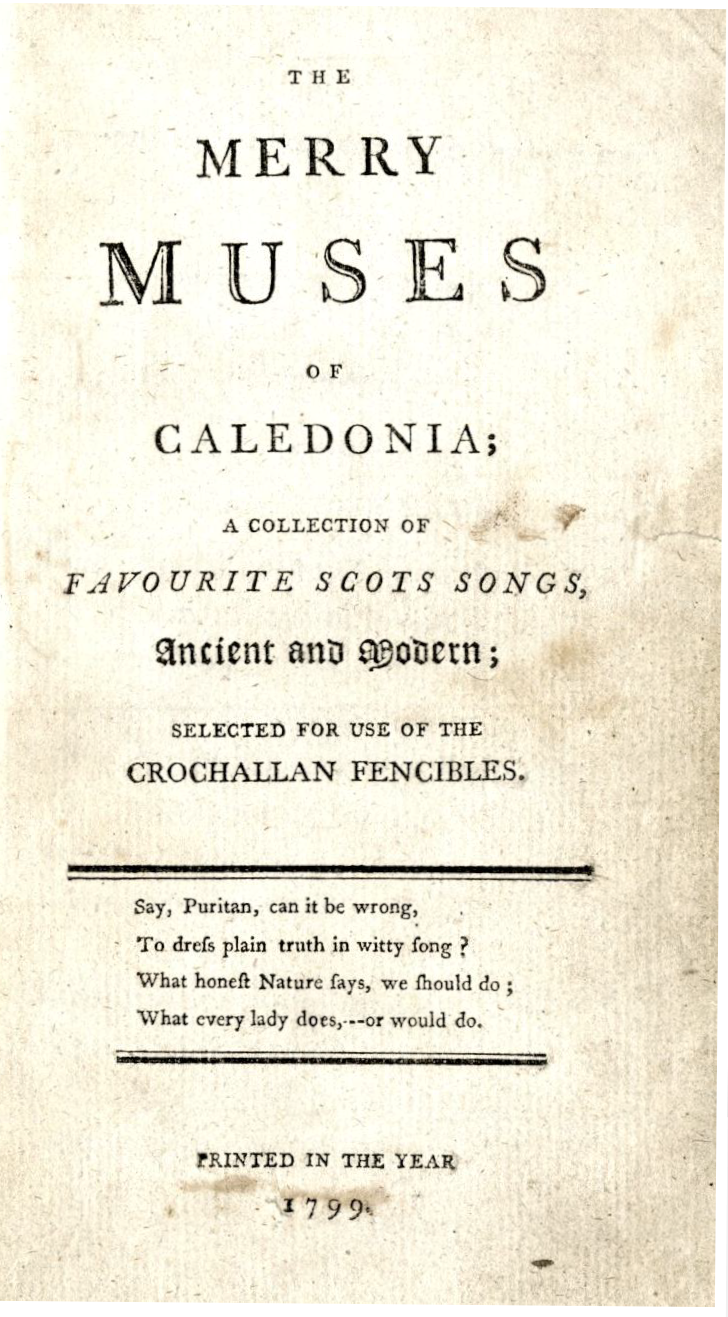Crochallan Fencibles on:
[Wikipedia]
[Google]
[Amazon]
 The Crochallan Fencibles was an 18th-century Edinburgh convivial men's club that met in Daniel ("Dawney") Douglas's tavern on Anchor Close, a public house off the High Street (part of the
The Crochallan Fencibles was an 18th-century Edinburgh convivial men's club that met in Daniel ("Dawney") Douglas's tavern on Anchor Close, a public house off the High Street (part of the
 The Crochallan Fencibles was an 18th-century Edinburgh convivial men's club that met in Daniel ("Dawney") Douglas's tavern on Anchor Close, a public house off the High Street (part of the
The Crochallan Fencibles was an 18th-century Edinburgh convivial men's club that met in Daniel ("Dawney") Douglas's tavern on Anchor Close, a public house off the High Street (part of the Royal Mile
The Royal Mile () is a succession of streets forming the main thoroughfare of the Old Town of the city of Edinburgh in Scotland. The term was first used descriptively in W. M. Gilbert's ''Edinburgh in the Nineteenth Century'' (1901), des ...
). The 16th century doorway bore the inscription "O Lord In The(e) is All My Traist (trust)".
History
Its name was made up from two sources: ''Crochallan'' is derived from a song, "Crodh Chailein'" ("Colin's Cattle"), which was a favourite of the then Landlord Daniel Douglas, and ''Fencibles
The Fencibles (from the word ''defencible'') were British regiments raised in the United Kingdom, Isle of Man and in the colonies for defence against the threat of invasion during the Seven Years' War, the American War of Independence, the Frenc ...
'' was a name for regiments of garrison troops which were raised for the defence of Great Britain (an 18th-century Home Guard
Home guard is a title given to various military organizations at various times, with the implication of an emergency or reserve force raised for local defense.
The term "home guard" was first officially used in the American Civil War, starting wi ...
).
William Smellie, the editor of the first edition of the Encyclopædia Britannica
First or 1st is the ordinal form of the number one (#1).
First or 1st may also refer to:
*World record, specifically the first instance of a particular achievement
Arts and media Music
* 1$T, American rapper, singer-songwriter, DJ, and rec ...
, was the founder of the club. He reminisced that:
The members of the club use military ranks to designate their positions in the club (as if it were a real fencible regiment), hence William Dunbar (died 1807)
William Dunbar (1459 or 1460 – by 1530) was a Scottish makar, or court poet, active in the late fifteenth and early sixteenth centuries. He was closely associated with the court of King James IV and produced a large body of work in Scots di ...
was the colonel of the club (rather than its chairman or president).
Smellie introduced Robert Burns
Robert Burns (25 January 175921 July 1796), also known familiarly as Rabbie Burns, was a Scottish poet and lyricist. He is widely regarded as the national poet of Scotland and is celebrated worldwide. He is the best known of the poets who hav ...
to the club in 1787. Burns compiled a book of popular songs for the club called The Merry Muses of Caledonia
The Merry Muses of Caledonia is a collection of bawdy songs said to have been collected or written by Robert Burns, the 18th-century Scottish poet.
Original text
The poems and songs were collected for the private use of Robert Burns and his fr ...
in which he writes of Smellie:
Other members included Alexander Irving, Lord Newton and Adam Gillies, Lord Gillies.
Dawney's Tavern was demolished in 1869.Grant's Old and New Edinburgh vol.2 p.235
See Also
*Edinburgh Cape Club
The Edinburgh Cape Society is a convivial Edinburgh tavern-based society which was first established in the 18th century. It is one of many Convivial Edinburgh Societies which were extant in the 18th century, but the only (known) one which surviv ...
* The Poker Club
The Poker Club was one of several clubs at the heart of the Scottish Enlightenment where many associated with that movement met and exchanged views in a convivial atmosphere.
History
The Poker Club was created in 1762 out of the ashes of The ...
Notes
References
* * * * 18th century in Edinburgh Clubs and societies in Edinburgh Members of Crochallan Fencibles Robert Burns Gentlemen's clubs in Scotland {{org-stub